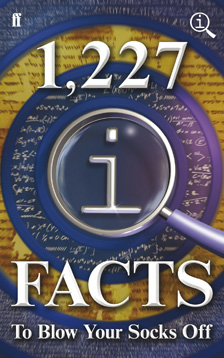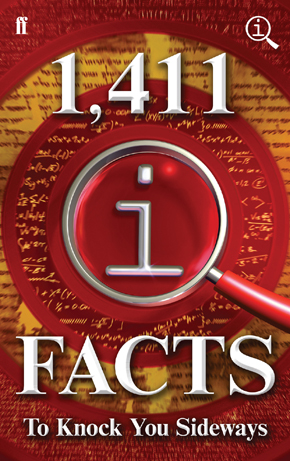Chekhov’s mongoose and the elusive orange
by Andrew Hunter Murray“Now, what I want is, Facts. Teach these boys and girls nothing but Facts. Facts alone are wanted in life.”
Charles Dickens, Hard Times (1854)
We at QI have taken the opening lines of Dickens’s shortest novel to heart. Our latest book contains nothing but facts, facts, facts: 1,411 times over. The book covers a huge range of subjects from roses to the Big Bang to hiccups to octopuses. Here’s an assortment of astonishing literary things.
1. Virginia Woolf’s first bestseller was a pet memoir
Virginia Woolf’s first published essay was an obituary written for the family dog. Later in life she wrote a biography called Flush from the perspective of Elizabeth Barrett Browning’s pet spaniel. It was hugely successful and sold 19,000 copies in the first six months – more than any of her previously published novels, which she found infuriating. Another great literary animal-lover was Anton Chekhov, who kept a pet mongoose called Svoloch, keeping it for about 18 months before donating it to Moscow Zoo so he could resume a life of travel. Chekhov was by no means the only writer to keep an unusual animal. Friedrich Schiller attracted fruit flies via the practice of keeping rotten apples by his desk so he could recall the aromas of the orchards of his childhood, and Charles Dickens’ family had a cat, seven dogs, two ravens, a canary called Dick and a pony called Newman Noggs.
2. John Steinbeck’s Of Mice and Men was originally called Something That Happened
This is by no means the worst possible title we know about. Alternative titles for The Great Gatsby included Trimalchio in West Egg, The High-Bouncing Lover, Among the Ash Heaps and Millionaires, and Under the Red, White and Blue. The first version of The Waste Land was formerly He Do the Police in Different Voices. Philip Roth’s Portnoy’s Complaint was, thankfully, not published under its earlier title, Wacking Off. And War And Peace was originally All’s Well That Ends Well. Peter Benchley’s Jaws spent a long time suffering under the prospective title Silence in the Water. His father Nathaniel made the excellent suggestion of calling it What’s That Noshin’ on Ma Laig?
3. Nobody knows where the title of A Clockwork Orange comes from
It is possible that A Clockwork Orange got its name after its author, Anthony Burgess, misheard someone in a pub talking about a ‘Chocolate Orange’. He said he’d overheard ‘a clockwork orange’ and that it was a cockney phrase, but, apart from his claim, there doesn’t seem to be any evidence that any cockneys ever used the phrase. Incidentally, before the Terry’s Chocolate Orange was first produced in 1931, the company sold a Chocolate Apple. There had also been, very briefly, a Chocolate Lemon.
 4. J.M. Barrie was nicknamed ‘The Furry Beast’
4. J.M. Barrie was nicknamed ‘The Furry Beast’
Barrie was only five feet tall and had a whole host of nicknames including JMB, Jimmie and even Sir Jazz Band Barrie. His other nicknames included ‘Little Barrie’ (now the name of a Nottingham alt-rock band) and the aforementioned ‘Furry Beast’. The other important name Barrie gave the world is that of Quality Street – the chocolates were named after a play he had written, which was so popular that the confectioners just copied it. Barrie’s most famous creation, Peter Pan, first appeared in his 1902 novel The Little White Bird. It was originally going to be called The Boy Who Hated Mothers.
5. Mark Twain sold his own brand of cigars after becoming famous
Mark Twain’s books sold pretty well, but he made a huge amount of money by lending his name to various products, including Mark Twain’s Memory Builder Board Game, Mark Twain Cigars (“Known to everyone and liked by all”), Mark Twain Tobacco, and a ‘Self-Pasting Scrapbook’, which sold 25,000 copies. He also invented a huge number of products, such as a pair of grape scissors, a chalk-based printing process, a steamboat paddle wheel to cut through sea ice, and the Twain Bed Clamp, which was designed to stop babies from getting caught under the covers.
6. Sir Arthur Conan Doyle tried to contact Oscar Wilde from beyond the grave
In 1899, Arthur Conan Doyle – who had then written the first Sherlock Holmes novel – went to a dinner with an American magazine editor and met Oscar Wilde. The latter made an enormous impression on Doyle. It is possible that the changes made to Sherlock Holmes after the first novel – his cocaine use and the more epigrammatic speaking style – came about because the starstruck Doyle wanted to make his hero more Wildean. The pair only met once again in Wilde’s lifetime, but in the 1920s, Doyle tried to contact Wilde, in spite of the fact that the latter had been dead since 1900. In 1923, a medium called Mrs Hester Smith claimed she was receiving Oscar’s thoughts from the grave, and supposedly ‘received’ a brand new play by Wilde, with the marvellous title, ‘Is it a Forgery?’ Doyle asked to be remembered to Wilde, and also invited the dead Wilde to make himself known to Mrs Doyle, who he said was an ‘excellent automatic writer’.
7. Jane Austen is the first person known to use the word ‘sponge-cake’
Jane Austen is cited more than 1,600 times in the Oxford English Dictionary. For plenty of these, hers is the first cited use of the word – and while she didn’t necessarily come up with the word, her use of it is the first known. This is the case with the word ‘sponge-cake’ (as she wrote to her sister, “You know how interesting the purchase of a sponge-cake is to me.”) Her other possible coinages include ‘dinner party’, ‘anti-English’, ‘to shut someone up’, ‘to bargain for’, ‘horror-struck’, ‘neat-looking’, ‘nice-looking’, and even the description of a dress as being ‘off the shoulders’. Others, however, did not catch on, such as ‘do-nothingness’ or ‘vanity-bait’. Possibly her biggest coup was the first proto-version of the phrase ‘If I’ve told you once I’ve told you a thousand times’. In Mansfield Park Mrs Price says, “If I have spoke once to Rebecca about that carpet, I am sure I have spoke at least a dozen times.”
8. In 1922, Ernest Hemingway’s wife lost his early works by leaving them unattended on a train
Hemingway’s first wife Hadley lost (or was robbed of) a collection of short stories and apprentice writings which were in a suitcase and went AWOL on the journey. She was so nervous about telling him, and paused so much about what the bad news was, that he assumed she’d been unfaithful to her. There is a scholarly theory that losing these works was a necessary step, which meant he then went on to develop his famous style and write the great works he later did. It could have been worse. Thomas Carlyle wrote a book called The French Revolution: A History. Unfortunately, he left it with his friend John Stuart Mill, who mistakenly let his housekeeper use it to start a fire.
 9. Tolstoy and Turgenev planned to fight a duel
9. Tolstoy and Turgenev planned to fight a duel
Tolstoy and Turgenev were scheduled to have a duel in 1861, but it was called off at the last minute. The bad blood between them had originated when Turgenev had read Tolstoy a draft of Fathers and Sons and Tolstoy had fallen asleep after just a few pages. They argued some days later and both started challenging each other and then apologising in writing, only to have their written apologies get lost in the post. Eventually they managed to cancel the duel and just decided not to speak to each other again. They didn’t speak for 17 years.
10. When he enlisted in the army, J.R.R. Tolkien’s son Michael put down his father’s profession as ‘Wizard’
Other writers have had interesting previous jobs. Before he was a famous author, Kurt Vonnegut owned and ran America’s first Saab dealership, Saab Cape Cod, in Massachusetts. (It went out of business.) Other authors have equally unusual back-stories; at the age of 18, J.D. Salinger helped with the entertainment on a Swedish luxury cruise ship, organising games and providing single women with dance partners. Joseph Heller was a blacksmith’s apprentice and John Steinbeck worked at a fish hatchery, breeding fish and giving tours of the place. Harper Lee worked at an airlines reservations desk. Finally, Douglas Adams was the bodyguard for a family of Qatari oil barons.
Postscript
If you knew NONE of the above facts you are clearly ready to read about anything and everything. You are very lucky.
If you knew SOME of the above facts you are clearly quite knowledgeable but could probably do with more information on your non-specialist subjects.
If you knew ALL the above facts you can take comfort that, compared with the vast body of knowledge out there, you don’t know anything at all.
1,411 QI Facts to Knock You Sideways is compiled by John Lloyd, John Mitchinson and James Harkin with ‘QI elves’ Anne Miller, Andrew Hunter Murray, Anna Ptaszynski and Alex Bell, and published by Faber & Faber, along with two previous collections. Read more.


